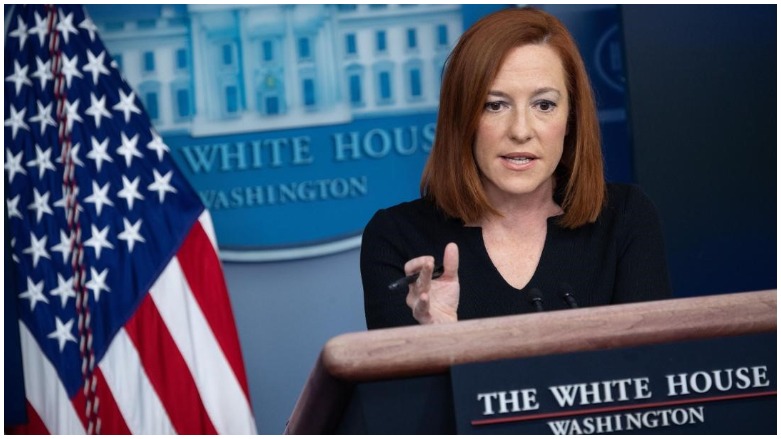White House: ‘We do hold Iran accountable for the actions of their proxies,’ even as nuclear stalemate persists

WASHINGTON DC (Kurdistan 24) - Speaking to journalists on Wednesday, White House Spokesperson Jen Psaki signaled a somewhat tougher line regarding the recent spate of rocket attacks against the US in Iraq.
Psaki made clear that the US did not regard the hostile actions of Iranian-backed militias in Iraq to be the work of those groups alone, but would hold Iran responsible for them.
Asked why the US had not responded to the rocket attacks, Psaki first noted that no final attribution had been made—a position the Biden administration has taken since the Feb. 15 rocket attack on Erbil.
She added that US President Joe Biden had spoken with Iraqi Prime Minister Mustafa al-Kadhimi the night before and that the rocket attacks had been “an extensive part” of their discussion.
Read More: Biden signals US commitment to Iraq in talk with Kadhimi
Psaki then added a new dimension to the White House position. “We do hold Iran accountable for the actions of their proxies,” she stated—something that she had not said before.
The White House’s clearer position followed two days after the State Department made a similar shift.
On Monday, State Department Spokesperson Ned Price stated, “We will hold Iran responsible for the actions of its proxies that attack Americans.” In a briefing, the previous week, on Thursday, Price had said, “There will be consequences for any group responsible for this attack.”
Psaki’s statement is the more important of the two, of course, as she speaks for the president himself.
Still, the administration’s statements do not go as far as what Rep. Michael McCaul (Texas), Lead Republican on the House Foreign Affairs Committee, has said is necessary: “to act quickly and decisively” in response to the rocket attacks “with clear attribution and other steps to hold perpetrators accountable.”
Read More: Rep. McCaul calls for quick, decisive action to rocket attacks in Iraq
Stalemate over Nuclear Issues Continues
A week has passed since the Biden administration first announced it was prepared to renew discussions with Iran over the nuclear deal concluded by the Obama administration in 2015, but renounced by the Trump administration in 2018.
That diplomacy is being conducted in close coordination with America’s European allies: Britain, France, and Germany, who are all signatories to the 2015 agreement.
Iran, however, has yet to accept the European Union’s (EU) invitation to participate in those discussions. Rather, it has imposed new restrictions on the monitoring of its nuclear sites by the International Atomic Energy Agency (IAEA.)
Read More: US avoids confronting Iran on nuclear issues, rocket attacks
It has suspended snap inspections and announced it will not provide to the IAEA recordings from the cameras that monitor its declared nuclear sites.
Pressed repeatedly by journalists as to whether Iran’s actions were acceptable and how long the US was prepared to tolerate this situation, Price repeated the US commitment to the talks envisaged in the EU’s invitation.
Notably, he declined to criticize Iran. In response to the fifth time that reporters raised the issue, Price stated, “Our patience is not unlimited.” But it sounded more like a way to placate reporters, rather than a stern warning to Iran.
Reuters explained the logic behind the US response to what it called Iranian “provocations”—including the two rocket attacks since the US announced its readiness to negotiate with Iran, as well as Tehran’s increasing violations of its commitments under the nuclear deal.
“The United States and three allies, Britain France, and Germany, have responded with studied calm,” Reuters said. “The response—or lack of one—reflects a desire not to disrupt the diplomatic overtures in hopes Iran will return to the table and, if not, that the pressure of US sanctions will keep taking its toll, US and European officials said.”
However, at least one US ally in the Middle East—Israel—sees the extended stalemate as dangerous.
On Wednesday, a spokesman for Israel’s Foreign Ministry warned, “Without supervision Iran will continue to act in the dark to promote its nuclear plan.”
On the same day, Israel’s Deputy Prime Minister and Defense Minister, Benny Gantz, who was Chief of Staff of the Israel Defense Forces (IDF) before entering politics, warned that, if necessary, Israel was prepared to take military action.
“The IDF is currently working to build up our forces and is preparing itself for any scenario, including one in which we would need to take action to prevent Iran from obtaining nuclear weapons,” Gantz said.
Editing by John J. Catherine